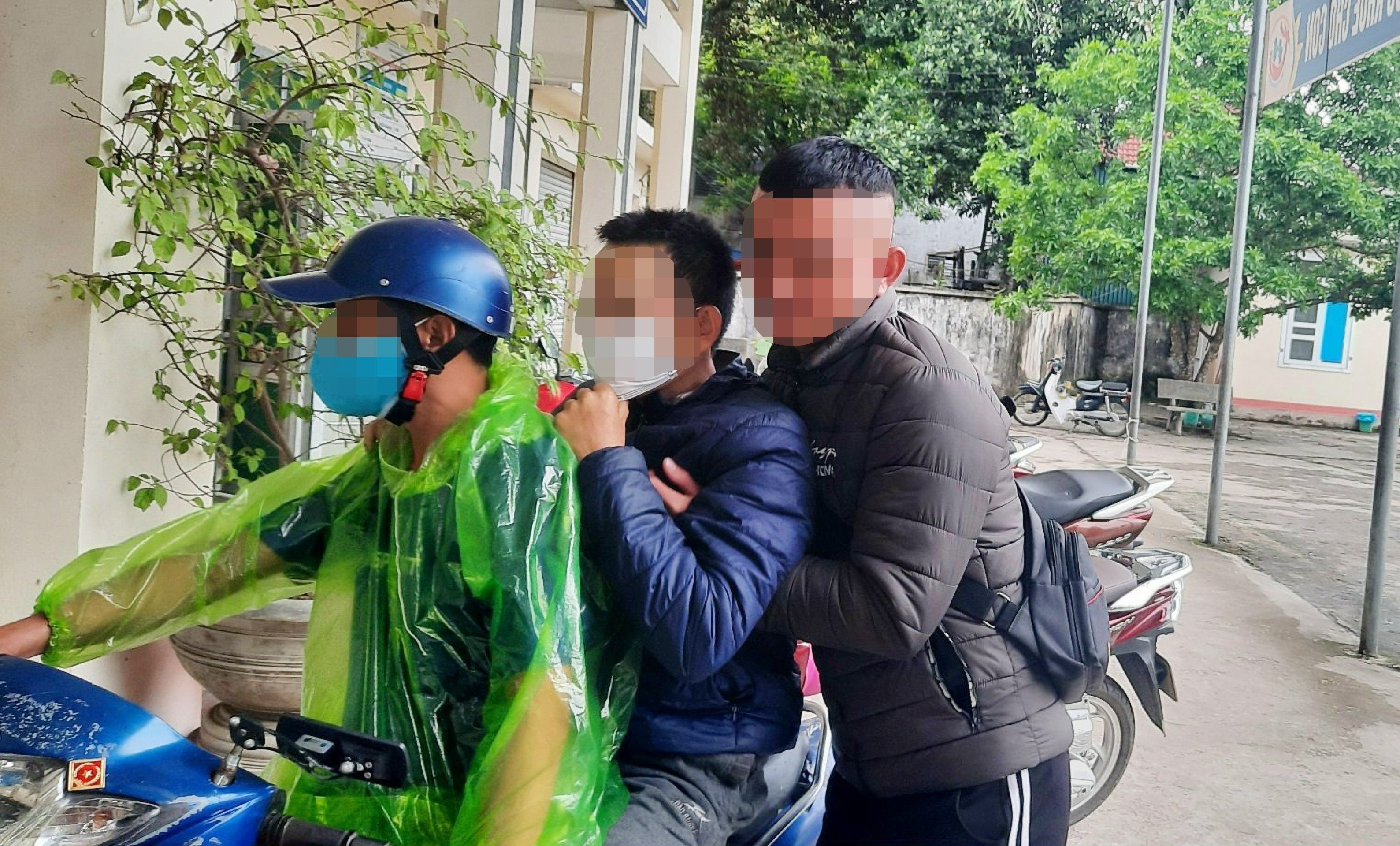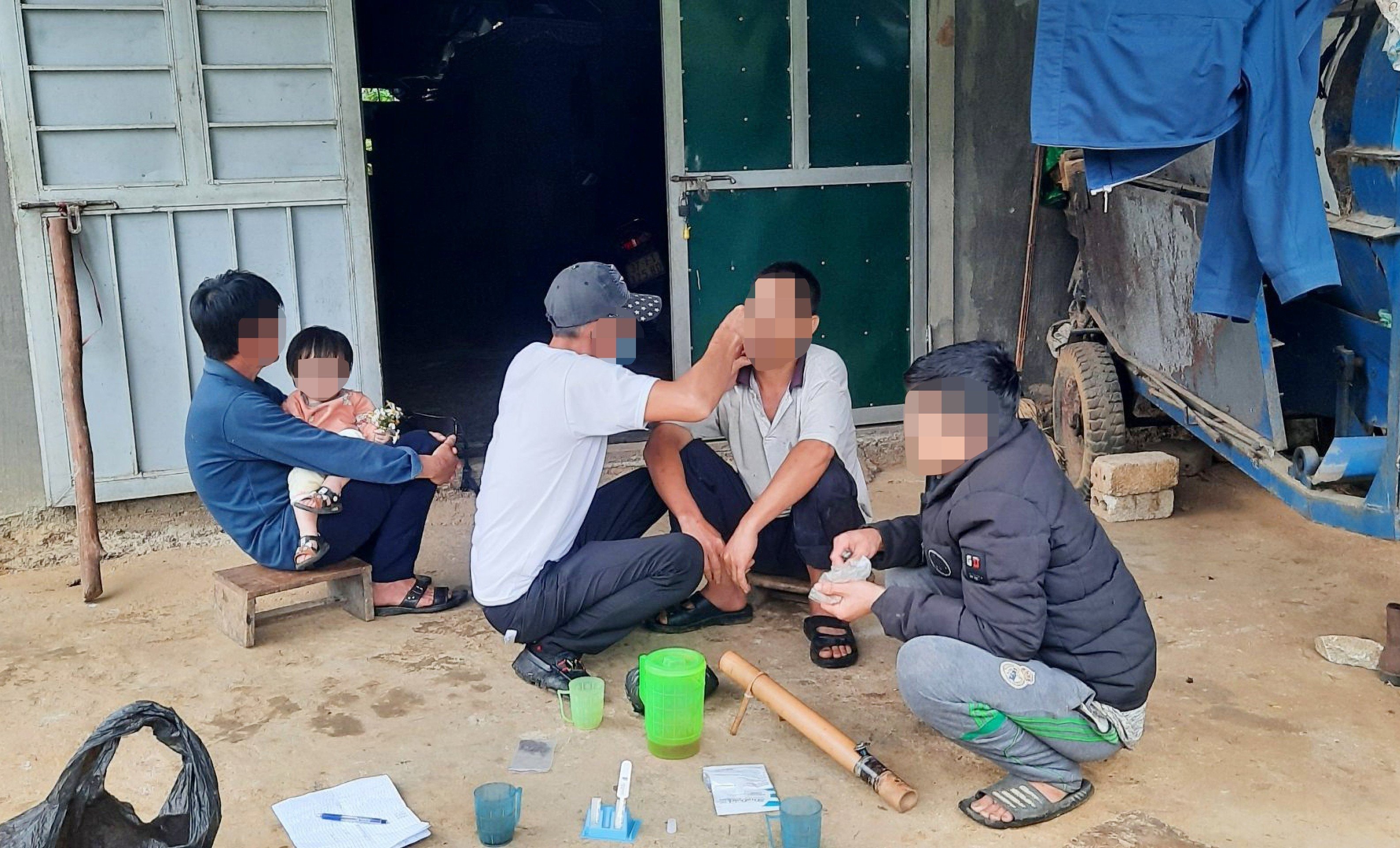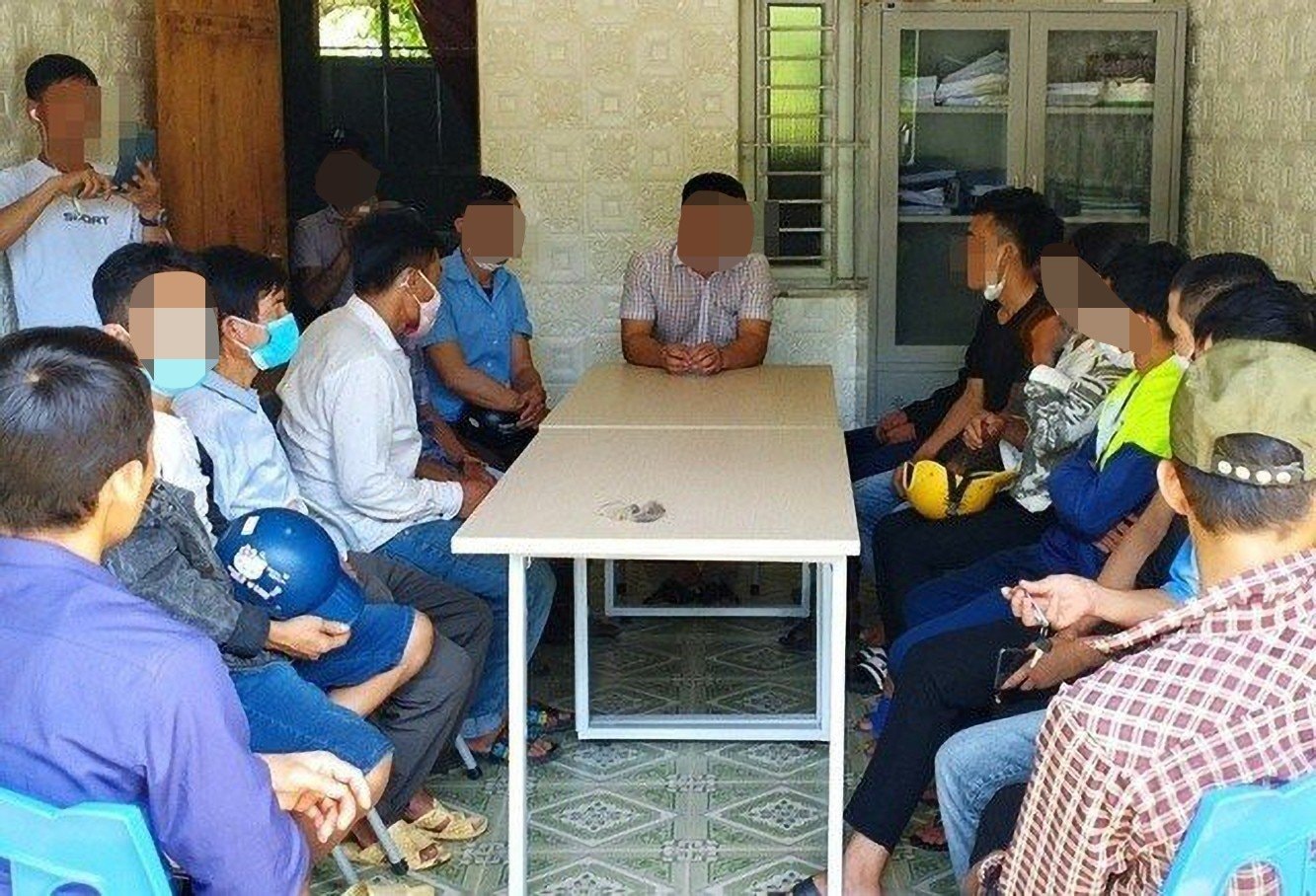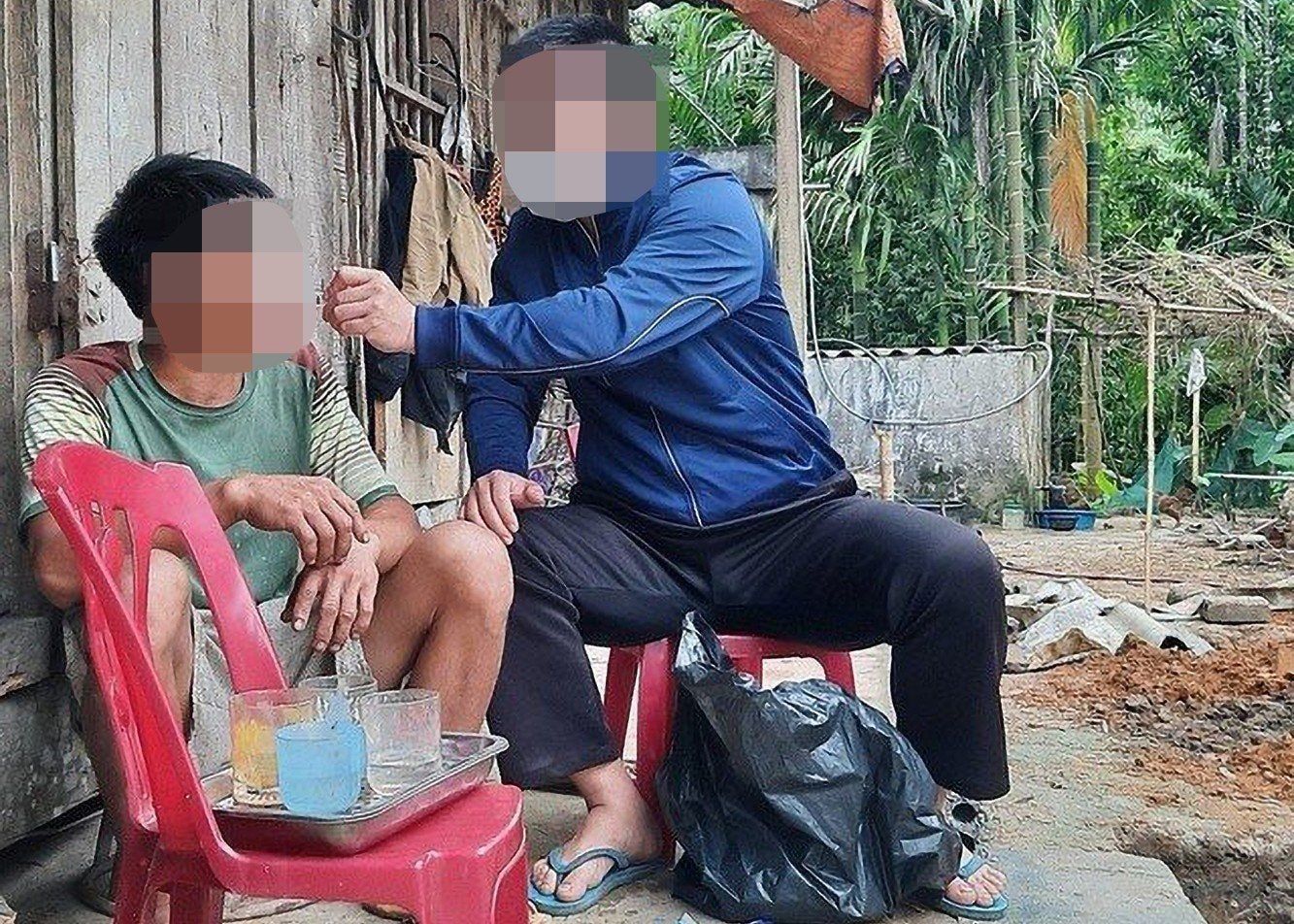Peers trek through forests and wade through streams to help people with HIV
(Baonghean.vn) - Despite their meager monthly allowance, they still do not hesitate to ride their motorbikes hundreds of kilometers every day, to propagate and encourage people at high risk of HIV/AIDS to take necessary measures. That is the story of peer educators in HIV hotspots.
The Sao Va Group
For over two years now, in the mountainous district of Que Phong, there has been a volunteer group that has been regularly helping hundreds of people living with HIV access medication and treatment. The group is called Sao Va.
The leader of Sao Va group - Mr. Lang Trung Hien said that the group has only 5 members, each member equips himself with knowledge from basic to advanced about the mechanism of disease transmission, measures to prevent the spread, and treatment methods. They find ways to approach and mobilize high-risk subjects such as drug addicts, families with HIV-infected people... to use condoms during sex, use separate needles when injecting drugs, get tested for HIV and then connect them to ARV treatment programs if they are infected with HIV.
The Health Department of Nghe An province recorded the first case of HIV infection since 1996. To date, the whole province has recorded more than 10,700 cases of HIV infection, of which 4,424 patients have died, 6,522 have progressed to AIDS, and more than 6,000 people are being managed and monitored.
In 2022, the whole province had more than 100,000 people receiving HIV counseling and testing, of which 315 cases were positive for the HIV virus. Of the more than 6,000 HIV-infected people being monitored, 4,800 were being treated at medical facilities, the rest worked far away or bought medicine to treat at home.
Que Phong district is a complex area for HIV. On average, each member of the group has to take care of and approach 40-60 people suspected of having HIV each month. Mr. Hien said that, in addition to having to travel long and dangerous distances, approaching and convincing people suspected of having HIV to get tested is also a problem, requiring members to have certain skills. Each person has a different way, but everyone must persevere, even when being chased away. "When it rains and the water in the streams and creeks rises, the group members have to sleep at the houses of local people. This is also an opportunity for them to confide and share more with their "customers," Mr. Hien said.
 |
Regardless of the sun or rain, they go to remote villages to take people at risk of HIV infection for testing. Photo: TH |
As the only female member of the group, Ms. Lo Thi Loan (Chau Kim commune) commented that up to now, most people still discriminate against people with HIV, so many people in the high-risk group still do not dare to get tested, afraid of being shunned by the villagers: "Some people know that I am coming to mobilize, but they hide. That is when I need to be patient, find the right opportunity to contact, listen and share. When they trust me, the work is considered 70% complete." As a woman, riding a motorbike through the forest and cutting streams all day is very hard, but she always feels that she gains more than she loses because she has more friends. At the beginning of the month, the group meets once to both re-evaluate the work and come up with new plans when some areas have new HIV cases. "Those areas must be given special attention, and must be approached immediately to prevent it for those around them," Mr. Hien said.
 |
Visiting homes to support HIV-infected people using treatment drugs. Photo: TH |
Crossing forests and wading streams to help people infected with HIV
Returning home when the village lights were on, Mr. Lo Thanh Nhat in Chau Kim commune, Que Phong district smiled with satisfaction: "Finally, the two young men I have been pursuing for nearly a month have agreed to get tested for HIV." Mr. Nhat is also one of the peer educators of the Sao Va group.
Also in a similar situation, Mr. Nhat said that the amount of HIV virus in his body has now reached the detection threshold, and he can have children. According to him, to achieve this result, it was a long process of treatment. Born in a place that used to be a drug hotspot, Mr. Nhat started getting involved in "white death" at the age of 16. Not having his own needles, he shared needles with dozens of other people to inject drugs. "When I found out I was HIV positive, I was still calm, not because I was reckless, but because at that time, I knew nothing about HIV," he said.
Until his health became worse and worse, the villagers gossiped day and night about his "social disease" and then shunned him, this young man gradually became aware of his condition. Looking far away, he said he still could not forget the image of an acquaintance taking the glass from which he had just drunk water and throwing it into the trash for fear of infection: "That day I went to visit, when I returned, I accidentally saw them take the glass from which I had just drunk water, wrap it in plastic, and throw it away. I had insomnia for several days. Depressed about life, I decided to hang myself. But luckily my mother discovered it and saved me in time, so I escaped death."
 |
A consultation session of Sao Va group. Photo: TH |
When his peers came to talk to him every day, Nhat gradually regained his faith in life, started to quit drugs and take HIV medication. He said: "I have received help from everyone, and I understand the importance of this work, so when my health stabilized, I asked to join the group." While undergoing treatment, Nhat crossed forests and streams to find the hottest spots for drug injections to contact addicts. Every early morning, after taking the medication, Nhat prepared needles, condoms, medicine, and notebooks, then got on his old motorbike and drove to each village to approach people at risk of HIV.
“Do officials also have HIV?” Mr. Nhat often receives similar questions every time he tells his “customers” about how he wanted to end his life when he found out he had the disease. Whenever he meets people suspected of having HIV, he usually does not go straight to the point but instead chats and asks about their lives. Only when they truly open up does he share knowledge, prevention methods, and HIV treatment methods. “When hearing about the medicine, many people say that taking it will make them die faster. I tell them about the medicine I took and the results I got beyond my expectations. Thanks to that, many people feel secure and want to be treated soon,” Mr. Nhat said.
According to Nhat, “everything has two sides”. Every time he tells his story, many people insinuate that “there is nothing good about it, so why do you keep spreading it?” He just smiles. “Many people don’t like it, but for me, the most important thing is to convince people to get tested and take medicine to keep themselves, their families, and the community safe,” Nhat said.
 |
Support for people infected with HIV. Photo: TH |
In charge of Tien Phong commune - an area with over 400 people infected with HIV, Mr. Ngan Van Un said that his work often starts from dawn until late at night, because the number of patients is large and the area is too dangerous. Many people avoid and chase them away, so Mr. Un has to find a way to get their phone number and talk to them on the phone every night to convince them. "Sometimes when I'm sleeping and I hear a strange number calling, I know that someone suspected of being infected with HIV needs me. In these cases, I just reassure them, ask for their address to find them as soon as possible," Mr. Un said.
Mr. Thai Van Nhan - Deputy Head of HIV/AIDS Prevention and Control Department, Nghe An Province Center for Disease Control said that the whole province currently has 30 peer educators, working in 6 groups. Although the allowance is small (from several hundred thousand to 1.5 million VND/person/month), not enough to cover living expenses, they are all very active and enthusiastic, contributing to preventing the spread of HIV.
HIV/AIDS is a dangerous infectious disease that can attack anyone, HIV infection does not discriminate against age, family, occupation, social status. Anyone who does not fully understand HIV/AIDS and does not practice safe behaviors is at risk of HIV infection. Nghe An is the province with the highest number of HIV infected people, ranking 6th in the country. The HIV/AIDS epidemic situation is still complicated. At the same time, Nghe An is also one of the key provinces for drugs, both trafficking and use.
